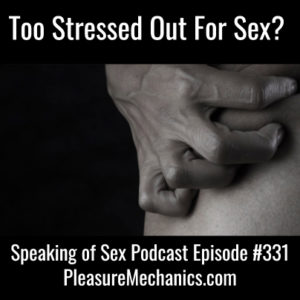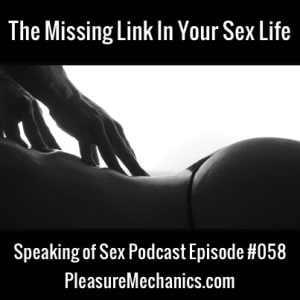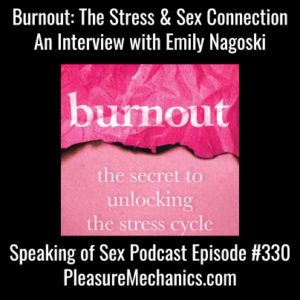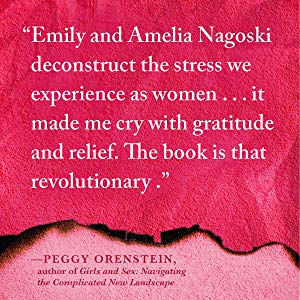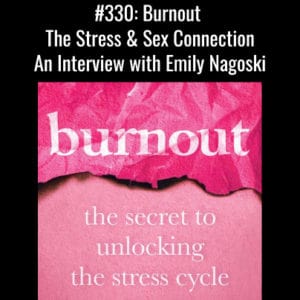Podcast: Play in new window | Download
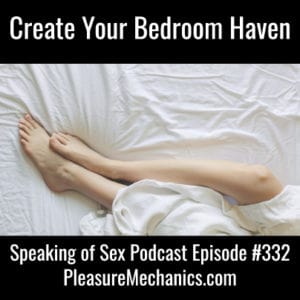
You spend a third of your life in bed. Two of the most important activities for your wellbeing – sleep and sex – happen there. So when is the last time you thought about your bedroom and if it is meeting your needs?
In this episode, we explore ideas to make your bedroom into a haven of safety and comfort so you can get better rest, enjoy more time connecting with your lover and have a bubble of love to rest, restore and revive.
We cover:
- how to make simple upgrades to make your bedroom more restful
- inexpensive ways to bring beauty and art into your bedroom
- how to deal with the paradox of using your bedroom for both relaxation and arousal
- why to think about the gender and erotic mood of your space
- using scent as a memory bridge to shift the mood
- communicating about what you need to sleep better when sharing a bed with your partner
Big thanks to #LubeLife for sponsoring this episode – use the code 20Mechanics for 20% off your order at LubeLife.com
Podcast Transcript for Create Your Bedroom Haven episode
Podcast transcripts are generated with love by humans, and thus may not be 100% accurate. Time stamps are included so you can cross reference or jump to any point in the podcast episode above. THANKS to the members of our Pleasure Pod for helping make transcripts and the rest of our free offerings happen! If you love what we offer, find ways to show your love and dive deeper with us here: SHOW SOME LOVE
Chris Rose: 00:01 Hi. Welcome to Speaking of Sex with the Pleasure Mechanics. I’m Chris.
Charlotte Rose: 00:05 I’m Charlotte.
Chris Rose: 00:06 We are the Pleasure Mechanics, and on this podcast, we offer soulful and explicit advice about all facets of human sexuality. Come on over to pleasuremechanics.com for our online home, where you will find our complete podcast archive, all of our online courses that are ready for you when you are ready to uplevel your erotic experience, and while you are there, go to pleasuremechanics.com/free and enroll in the Erotic Essentials, our free online course, which is packed with some of our favorite techniques and strategies, and even a free foot massage demonstration. Get started. What are you waiting for? Pleasuremechanics.com/free.
Chris Rose: 00:50 All right, today on the podcast, we are going to be talking about your bedroom, and little changes, maybe some big changes, you can make to your bedroom to have a more restful and erotic experience while you’re in that room of your home. Before we get started, I want to thank our sponsor for this episode, Lube Life. Lube Life offers amazon.com’s bestselling line of personal lubricants. There’s a whole range of water based, and silicone based, and even flavored lubes, if you’re into that kind of thing. Use the link in the show notes page for 20% off your entire order at Lube Life, and thanks so much to Lube Life for sponsoring this episode.
Chris Rose: 01:34 All right, on to your bedroom. It’s an important room, when you think about it, in terms of your life, but how often do we really think about our bedrooms, and think about what we could do to make them not only more of a haven, so we can get more rest and better sleep, but also to make them an erotic sanctuary? Is your bedroom supporting your sex life, or is it maybe blocking your sex life in some way, or causing discord in your sex life that you haven’t actually named yet? So we’re just going to be exploring all things boudoir today on the podcast.
Charlotte Rose: 02:15 Yeah. It’s so valuable, sometimes, to just take a step back and look at spaces in our life and see if they are supporting what we want them to be doing in our life, in this case sleep and sex. So this is just an opportunity to really reflect on what we’re creating in our life.
Chris Rose: 02:33 And we’re going to hope to offer you a wide range of points of reflection, and options. We know it is not possible to just like redo your bedroom, and buy all new furniture, and make it the sensual sanctuary of your dreams for everyone, but maybe there are little tweaks you can make. Maybe there are little things you haven’t thought about, in how this room impacts your life. If you think about it, you probably spend about a third of your life in your bedroom, and it’s easy to think, well most of that is while we’re asleep and unconscious. Therefore, it doesn’t really matter. But it does matter, and it matters in terms of sleep, and it matters in terms of sex.
Chris Rose: 03:12 And as we approached this conversation, I was thinking about is it a paradox that we’re trying to design a space for both restfulness, and this sense of a haven, where we can really sink into our deepest sense of safety and rest, to sleep well, but also trying to create a space for excitement, and arousal, and seduction? So how do we straddle these two functions for one room?
Charlotte Rose: 03:42 And that’s going to be so personal, between you and your partner, and your aesthetics, and your desires, for the feeling you want to create in this room, and I think the answer to that is going to be different for each person and each couple. What we find calming, what we find erotic, are going to be so, so different, but it’s valuable just to reflect on.
Chris Rose: 04:02 So, let’s walk through the bedroom and think about how we can optimize these spaces to be more supportive of our overall wellbeing and our sexual wellbeing. Before we get started, I want to acknowledge this is part of our series on burnout and on completing the stress cycle, and it turns out sleep is really, really important for our health. And this is not news to anyone, but something about the way the Nagoskis wrote about it in the Burnout book really reminded me that sleep is not something we can catch up on later. It’s not something we can compromise on. Our bodies need it, and if we are not getting the kind of sleep we need, we are doing ourself a disservice. And there’s no, like, debate around this in the medical community.
Chris Rose: 04:52 We could do a whole episode about the benefits of sleep, but I don’t think anyone really needs to hear that. We all know the importance of sleep, and I think we could, you know, extrapolate on if you are under-slept, and therefore fatigued, how that would then create downward spirals in your relationship. You might get more moody. You don’t have enough energy for dates. You don’t have enough energy for physical activity, let alone sex, right? So it’s like sleep is this one thing we can give ourselves to uplevel all of our life, and just support ourselves as an organism. Sometimes, when we think about having better sex, we forget how we are having sex as a holistic organism, so something as simple as sleep can really impact how much you want sex.
Chris Rose: 05:44 Like, your body has to be pretty well resourced to be interested in fucking. It’s kind of an extra bonus when your body is, like, in a pretty good state, and it’s like, “All right, let’s play.” If it’s in crisis, and is under-slept, undernourished, under-resourced, it takes a lot more to get those gears grinding. So don’t discount the importance of something like a good night of sleep on fulfilling your wildest fantasies. There’s a very direct connection.
Charlotte Rose: 06:14 We live in a culture that is so obsessed with moving fast, and achieving, and productivity that to carve time out, significant time out, to really rest is quite countercultural, and we’re doing this episode because it’s probable that some of you really need to be reminded of this. Maybe not all of you. We want to remind us all that sleep matters, and is medicine for the body, and supports your sex life, because you are resourced.
Chris Rose: 06:46 The Nagoskis talk about how we are not complete without sleep. Learning is not complete without sleep. Exercise, movement, is not complete without sleep. Social interaction is not complete without sleep. And that was a really good reminder for me of all these things we do bring our time and energy to during the day, learning, physical exercise, social engagement, like loving people, all of those things need the sleep to complete. It’s a great chapter of the book. It really just was a very sobering reminder for us, especially as new parents, recovering from health crisis, like giving ourself the gift of sleep is a beautiful thing.
Chris Rose: 07:32 So, let’s go to the bedroom. Let’s go to the bedroom. When you walk into your bedroom, how do you feel? How do you feel? Is it just an extension of your house, or is it a special room in some way? We want to shoot for when you walk through the door of your bedroom, you feel a little different. You feel invited into an inner sanctum, an inner sanctuary within your own home, would be one way to think about it. What do you want to feel when you go to your bedroom? Do you want to feel calm? Do you want to feel serene? Do you want to feel supported, comfortable and cozy? Some people like a really sparse bedroom. Other people like a lot of mementos. What is the vibe you are going for, and have you talked to your partner about it if you share a bedroom?
Chris Rose: 08:24 Because sometimes, not always, but sometimes it kind of falls on the woman in a relationship to decorate, and I’ve heard from men who have said to me, “I can’t get horny in my bedroom, because it looks like a Laura Ashley store, or it looks like a little girl’s room. My wife’s stuffed animals are on our bed, from her childhood, and it just turns me off.” Things like that, or like, do you have a big picture of your family next to the bed, so you’re trying to fuck your wife, and your eyes fall on the gaze of your child, and maybe that’s a turnoff. What are the little things in your room that can be tweaked, and can that be a really active collaboration, so both of you feel good? So look at the gender of the space, and do both of you feel like reflected and supportive, and does it feel like a collaboration? Is this bedroom a place where you both belong?
Charlotte Rose: 09:20 Beautiful, yeah. I think family photos are great to put all the rest … put everywhere else in the bedroom, and-
Chris Rose: 09:27 So you as an artist, how do you feel about art in the bedroom, and … Go to the walls, Charlotte? What should be on the walls of a bedroom?
Charlotte Rose: 09:33 I mean, I think ideally things that feel evocative of the kind of sexuality and sensuality that you want to create for yourself and in your relationship. We can use art on our walls as placeholders for ideas, experiences, sensations, what we want to evoke for ourselves, and we can be intentional about that together, and it can be a fun experience to pick things out together, potentially.
Chris Rose: 09:59 And think about hotel rooms you have been in. We’ve all been in those frumpy hotel rooms, where they have like pictures of little girls in floral dresses with baskets of flowers on the walls, and that will evoke a different feeling than going to a hotel room with beautiful modern art, or crashing waves, or … You know, what images evoke the feeling state you are going for? And give yourself permission to change things up and try it out. Art doesn’t have to be expensive. You can frame images out of like old books, go to art fairs, by art from students. Charlotte has beautiful paintings.
Charlotte Rose: 10:40 I haven’t really come out to our audience about that yet. I guess I am now.
Chris Rose: 10:44 The artist within you is stirring again, after our child is growing up-
Charlotte Rose: 10:47 Yes.
Chris Rose: 10:47 … but let’s use art, and again, some people will really resonate with this and other people won’t, but continuing from the walls, think about your curtains, and your sheets, and the colors in your room. What colors are you bringing into your bedroom, and do these evoke what you want to evoke? And again, we have to think about this paradox, because what we want to do in order to calm our bodies down and sleep is different than what we want to do to amp our bodies up and get aroused and excited.
Chris Rose: 11:19 I had an amazing art history teacher in Barcelona, who was this amazing old guy. He had lived through the Spanish Civil War, and was friends with Picasso, and slept with Dali’s wife, and was just a wonderful man. And he, in his apartment, had two bedrooms, as a lifelong bachelor. He had the bedroom for rest and the bedroom for entertaining the ladies, he told me, and the entertainment room was like a full-on sensual boudoir. You know, it was a four-post bed, and it was like red velvet, and like lush.
Chris Rose: 11:53 Most of us don’t have the luxury of two rooms, but can we create kind of a dual feeling? Can we create a serene platform for our rest, and for that sweetness, and cuddling, and coming together at the end of the day, that feeling of sanctuary together, and then have things that can transform the space, and create a secondary feel, so kind of like an overlay? And that might just be a change of lighting. That could be some candles you light, some scent you bring in, a change of sheets, or you know, you pull off the blanket and the bed is a different color, something. Like, is there a way you can create a mental cue that this room has two different purposes and functions?
Chris Rose: 12:44 And again, this will depend on your home situation. If you live alone with your partner and can fuck in any room of the house, maybe your bedroom is really serene, and you have a corner of your living room that has your sex furniture. I don’t know. If you have kids coming in and out of your bedroom, you might not want to hang up paintings of nudes. That’s kind of up to you. So this all has to fit within your lifestyle. Just saying that again. There is no one-size-fits-all advice for how your bedroom should look. We just want you to walk in and feel that sense of, “Ah, I’m home. I’m here. This feels good.”
Chris Rose: 13:22 This also means things like keeping it clean, clearing out clutter, and laundry baskets. What are you looking at when you lie down in bed at night? Does your eye wander to chores? Does it wander to a cluttered desk, with your checkbooks and the bills stacked up? Could that go in another room? A lot of this is just making changes on purpose and seeing what happens.
Chris Rose: 13:46 Another experiment you might try, we’ve been doing recently, is we got a cell phone caddy. I went to Michael’s art store, and I got a little wooden box, and we have it on a bookshelf at the front of our home, and we are now trying to be in the practice of leaving our cell phones there while we’re in our home together. And just having a $3 box has changed our behavior, and therefore, it changes our experience of being together, around the table, without our phones, of coming to bed without our phones. So how do you change kind of the architecture of your lifestyle to support the experience you want to have?
Charlotte Rose: 14:26 The Nagoskis talk about, in your relationship, wanting to create a love bubble, and we want to bring that idea into our bedroom. When you enter, can it feel like a bubble of love between you and your partner? What would that feel like for you? It’s kind of an exciting idea.
Chris Rose: 14:43 Do you want to talk about scent at all? We’ve talked about the visual. We’ve talked about the kind of energetics of the space. How do the other senses fit in, so smell, the physical feeling of sheets? What would your thoughts there be?
Charlotte Rose: 15:00 I feel like scent and plants are so valuable to bring in, if you’re into that kind of thing. Scent is a beautiful tool to bring into the bedroom, both for relaxation and for sensuality. Different people react differently to scents. Some people love them. Some people don’t like them. There are a lot of artificial scented candles on the market, and they can really affect people’s bodies, so there are essential oils, there are more natural ways you can bring scent into the room, that can have a really beautiful effect on the body, and can act as a bridge to certain states of being. So that’s something to explore. You can make room sprays with essential oils. You can use diffusers. There are some cheap and effective diffusers out there, and you can just get one bottle of essential oil, and that can be like your room’s love bubble zone, that you kind of begin associating.
Chris Rose: 16:02 When you say a bridge, I think it’s important just to say what that means. Scent is very associated in the brain with memory. If you smell a certain smell, you can immediately have this whole-body memory of a kitchen when you were a kid, and a specific dish someone used to cook. These parts of the brain are very, very linked, so if you have a specific smell that you diffuse into the room every time you have sex, and then you’re getting ready for a date night, and you put a drop of that in the diffuser, it starts reminding your body of the feeling state of sex nights, versus if you put a drop of a different essential oil, maybe a lavender, or something really relaxing, and that is what you put on when you’re trying to relax and go to sleep at night, this can be a way of cuing your body for these different states we want to feel in our bedroom.
Chris Rose: 16:57 So Charlotte is our essential oil queen around here. I am the really sensitive one when it comes to artificial smells, like certain bathrooms at restaurants I can’t go in, because of all the chemicals, so we had to work together, again, to find which essential oils worked well for both of us, and there were certain smells she loved. They triggered me, so they were not a good fit for both of us, and that’s something to always kind of go back to, is again, the Venn diagram. We talk about the Venn diagram of your pleasures, and your kinks, and your fantasies, but what about the Venn diagram of your comforts, and your joys, and what makes you feel safe and at home? Because that’s the feeling we’re mostly going for in the bedroom, and then you kind of layer eroticism on top of that.
Chris Rose: 17:46 Plants are kind of my domain in the house. I love house plants, and they can actually be very cheap, and a way to totally transform the space. I recently had to go to Walmart for another reason, so I ended up buying a few orchids from Walmart, and they were like $12 orchids, and I found some decorative bowls in our kitchen that we hadn’t been using it, and for $24, we now have beautiful orchids on both side of our bed. And this is like an accessible way … And orchids, by the way, will last for six months in bloom, so for $10, you have half of a year of beauty in your house, that will go so much further than a cheap bouquet of carnations, right? So how do we leverage our resources? How do we make beauty and indulgences that last?
Chris Rose: 18:40 One thing you taught me about was investing in really good sheets and towels, and how our sheets are this thing that we lie on for eight hours a night, and we want to make sure that feels good to our skin. So I have learned having a winter set of sheets, and like warm, cozy flannel, and then transitioning into spring and summer sheets, nice cool cotton or bamboo. These are ways we take care of ourselves, and we honor the sensuality of our lives. If you are using an old, torn towel with poop stains on it from your kid to get out of the shower, like that does not signal pampering, and you know, like what are you telling yourself with the objects and the textures around you?
Chris Rose: 19:26 It’s great to think about, and then again, I know everyone can’t just go and buy new sheets, or a new bed, or a new mattress, but what can you do? What little upgrades are accessible, and affordable, and available to you right now, because little changes then can like spark big feelings, and motivate bigger changes and bigger upgrades when they’re accessible to you, and you can figure out what those upgrades might even be.
Charlotte Rose: 19:52 Yeah, I’m always amazed at how the simple act of bringing plants into the bedroom, or any room, can just completely change the feeling. It’s kind of amazing.
Chris Rose: 20:04 Another huge factor to consider is lighting. This is another piece I am crazy about. I get really light sensitive at night, and a bright, glaring light in a room puts me in a bad mood. I can really just, like … So noticing that lighting is really important to me, I take whatever steps I can, which usually means turning the lights out, but candles, low lights, dimmer switches, all of these things can make a huge difference, and I was recently talking about this with one of our patrons over at patreon.com/pleasuremechanics, where you can support the show with a monthly donation.
Chris Rose: 20:46 I was talking to one of our patrons, who is an ex-pro cinematographer, and talking about lighting, and asking for some of his thoughts on it, and he actually developed an entire guide called Turn on Your Love Light, that we’re going to make available to our other patrons. There’ll be a link in the show notes page. But he really walks us through factors to consider, and gets kind of geeky and technical with us, thinking about the warmth of lighting, and what kind of bulbs create different warmth feels, and flatter the body, and make you feel more relaxed and sensual, versus more energetic. So big thanks to Allen for putting together this lighting guide for us. That will be posted on patreon.com/pleasuremechanics, for all of our lovely patrons.
Chris Rose: 21:40 One tip I really loved, especially as light bulbs are moving towards LEDs, is how to choose LEDs that feel warm, and he gives us the exact bulbs, and wattages, and temperatures to go for, and I think I’m going to be switching out some of our light bulbs after this, and really consider the lighting in your bedroom. If the only lighting option is a bright overhead chandelier, maybe invest in some side lights, some fairy lights, some string lights, some rope lights, like whatever works for you, and get creative with it, and notice how lighting affects your experience.
Chris Rose: 22:24 All right, so we have walked into your bedroom. We have considered the clutter, the mess we could clean up, the office desk we might be able to move to another room. We’ve talked about the objects in your room creating kind of an energetic feel, so we’ve given kind of a physical makeover to the space. I do want to switch now and talk about what happens in bed, and how to negotiate some of the actual mechanics of sleeping.
Chris Rose: 22:53 Before we do, I want to take a moment and thank our sponsor for this episode. Big thanks to lubelife.com for sponsoring this episode. Lube Life offers amazon.com’s bestselling line of personal lubricants. They have water-based lube, which is compatible with condoms and toys, silicone-based lube, which offers a long-lasting glide. A lot of people love it for butt play. And flavored lube, which some people love for oral sex. All of their products are made in their USDA-certified organic facility in California, with top-quality ingredients, so you can trust what you are reaching for when you need extra slip, slide, and glide in your erotic touch. Go to lubelife.com and use the code 20mechanics for 20% off your entire order. That’s 20mechanics at lubelife.com, or use the link in the show notes page, and big thanks to lubelife.com for sponsoring this episode.
Chris Rose: 24:00 All right, so back in your bedroom, I want to talk briefly about the things that happen in your bed. And of course, we talk about many things that happen in your bed in all of the episodes. I want to talk specifically here about sleep, and having a conversation with your partner about anything you can do to make your two bodies sleep better next to each other, because I think a lot of us have this Hollywood image that, “If we’re in love, we’ll just cuddle up, and spoon one another, and sleep entangled and blissfully all night long,” but that image doesn’t always work for people, and our bodies need different things to sleep well.
Chris Rose: 24:43 Some people love sleeping entangled in their lover’s arm, and are kind of like a puppy that doesn’t want to lose contact, and if you roll over, they’ll roll right into you. Other people, myself included, benefit from space around my body, and I don’t like having extra wrinkles. I can’t wear, like clothes and have sheets, right? I need, like, bare skin, no wrinkles in the sheets. I sound really high maintenance in this episode. I just know what works for me, whereas Charlotte wears a lot of clothes to bed, and really likes to stay warm, so we have different temperature needs.
Chris Rose: 25:20 And after a while of sleeping together, we realized that we need two duvets, two blankets, so she has a heavier duvet in the winter, I have a lighter duvet. Why are you laughing? Charlotte is cracking up over our duvets.
Charlotte Rose: 25:34 I just like the idea of like I’m wearing a lot of clothes. I’m not wearing like [inaudible 00:25:47] Sorry. I’m not wearing so many [inaudible 00:25:48]
Chris Rose: 25:54 Charlotte. All right, Charlotte is now-
Charlotte Rose: 25:55 I just [crosstalk 00:25:55]
Chris Rose: 25:55 … having a total breakdown about the idea of wearing so many clothes to bed. She wears-
Charlotte Rose: 25:59 I just don’t want you to think I was wearing like 15 layers. [inaudible 00:26:04]
Chris Rose: 26:04 It’s really sexy. She wears snow pants, and gloves, all meaning … All right, we are breaking your ear holes with all this laughing.
Charlotte Rose: 26:12 Okay.
Chris Rose: 26:15 All is to say we have different temperature needs, and temperature is one of those things, like our body just has different needs, and you can’t really love your way through that, you know? So it came a point where I was, “Charlotte, I love holding you. I love cuddling with you. I will hold you as long as you want, until you’re snoring, and then I am gone,” so now you’re snoring in all your clothes. Then I’m going to roll over and sleep by myself. I think especially the permission to have two blankets, two duvets, and take care of my own temperature, made sleeping together sustainable.
Chris Rose: 26:55 So, how do you sleep together? Do your bodies like a lot of contact? Do you want more space? How is your temperature? Make sure you are both accounted for and taken care of, and that one person’s needs aren’t dominating the sleep situation, and you’re not martyring yourself. Like, giving up sleep every night to make your partner feel comforted will not serve the relationship in the long term. So just have a really honest conversation about that. Talk about what you need, in terms of intimacy and connection, and what are those bedtime rituals? I always try to make sure, for 12 years, that the last words I say are, “I love you,” and that was a really intentional choice early on, and I really wanted to do that, and I now do that, I and just try to like mutter, “I love you,” before I go to bed every night. So what are little things like that that make you feel safe, and comforted, and that you can share this bed fully?
Charlotte Rose: 27:57 That’s so beautiful. Couples can figure out just little rituals that you can do before sleep, before getting in bed, that really make you feel loved, and connected, and cared for, and having a conversation, being intentional about it, can really make a difference in the long-term relationship, if you get into beautiful habits that make you feel good.
Chris Rose: 28:20 And part of this conversation might be you don’t go to bed at the same time. One of you stays up way later. Does the other person want to be kind of tucked in, and hang out with a little bit, and cuddled, and then kissed goodnight, and then the other person slips away for their late-night stuff? What would make you feel kind of you’ve completed the day together, and you have a point of connection and intimacy, even if it’s not sex, to complete the day and transition into sleep? While you’re in this conversation, talk about things like, “Am I allowed to wake you up in the middle of the night if I’m horny? Is that ever okay? How do you feel about morning sex? Am I allowed to initiate sex in the morning while you are asleep?” Right?
Charlotte Rose: 29:07 That’s a great one to have consent around.
Chris Rose: 29:09 Yeah.
Charlotte Rose: 29:09 Before experimenting with.
Chris Rose: 29:11 Like, is morning blowjobs on your morning wood okay, or is that like really irritating, because it makes you have to pee, and then you get awkward? Like, people have different requests around this, so have a conversation. Talk about how to optimize your bedroom, your sleep, and know that any steps you take towards getting better sleep will pay dividends in your overall wellbeing, and your relational wellbeing, and your sexual wellbeing. We need to be well rested to be the fucking goddesses and gods we are. We need to be well rested to be in good working order. We need good sleep to function well, to heal deeply, to integrate our learning, and our social learning. It is so important on all levels, and sleeping well as a couple, if you can get this down and find the ways that support both of you, it can be a really, like, nourishing part of your relationship.
Chris Rose: 30:15 I really love sleeping with Charlotte, and during the baby years, when she spent more time sleeping with our child, in our child’s room, I really missed sleeping with another body. For me, it’s like curling up in the cave at the end of a day with like my animal kin. That’s kind of really how it feels to me. It’s like the smells, the sensations, and this breathing body that I feel safe next to, and that I can slip into sleep and dreams, and know she’s there for me, and we’re loving each other, like even in the unconscious. That, for me, is very romantic. Like, sleeping well next to each other, and the sound of Charlotte’s snoring, and her breath, you know, like these things are very, very comforting in long-term relationships, and we only got there because we worked on it, and we figured out what works best for us. And now, it works, and we have a beautiful bed.
Charlotte Rose: 31:15 But it took a while, sometimes, figuring out like the evening rituals of going to bed, and one person going to sleep, one person staying up. Those things, there can be like some hurt feelings, some unexpressed needs, like some uncomfortable conversations-
Chris Rose: 31:28 “I’m lying here in bed waiting for you, and you’re watching porn.” “I didn’t know you were waiting for me. I thought you had gone to bed.” “Well, why don’t you come and check on me?” Like, that would have been avoided with a conversation, right? How-
Charlotte Rose: 31:41 That wasn’t the specific conversation we had, by the way. Not that there’s any shame in that conversation, but yes, having those conversations, so you can get to a more unified place, whatever that looks like for you, is valuable. Also, just in terms of creating your room as the love bubble that you want to be in. I think it’s like valuable to make a space that you want to hang out in kind of casually before bed, that it’s a place that you guys both want to go to, and just be together for a while before sleep, because that is a space that can lead into sex for some people some evenings. It creates more opportunities and more moments of potential intimacy if that is right for you that day, but just making it a space that you move from a living room or a dining room to like be in together as you wind down from the day can be a great invitation or gateway into other states, either of sleep or sex.
Chris Rose: 32:42 The gateway to sleep and sex are open. All right, we hope this has been useful to you. We hope that you walk into your bedroom the next time you’re in your home, and look around, and think about how you might optimize it for yourself and your partner, and be in touch with us. Let us know. If you love this show and want to support our work, come on over to patreon.com/pleasuremechanics. That’s P-A-T-R-E-O-N, patreon.com/pleasuremechanics, and you have to type it all in, because we’re an adult show. We are unsearchable on Patreon, so type it all in, or click the link in the show notes page, and join us with a sustaining monthly pledge. Five bucks a month makes a huge difference in our ability to do this work and put out this show for free, week after week, so please join us at patreon.com/pleasuremechanics, and this week, you will find our lighting guide from our patron. Thank you so much, Allen, and we will be back with you next week with another episode of Speaking of Sex with the Pleasure Mechanics. I’m Chris.
Charlotte Rose: 33:54 I’m Charlotte.
Chris Rose: 33:55 We are the Pleasure Mechanics.
Charlotte Rose: 33:57 Wishing you a lifetime of pleasure.
Chris Rose: 34:00 Cheers.
